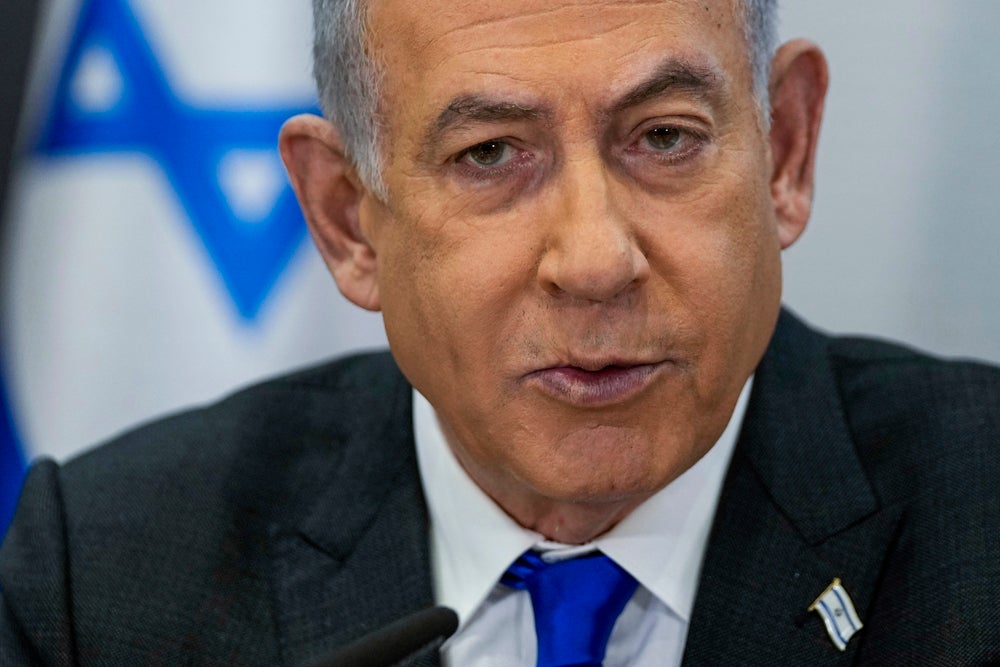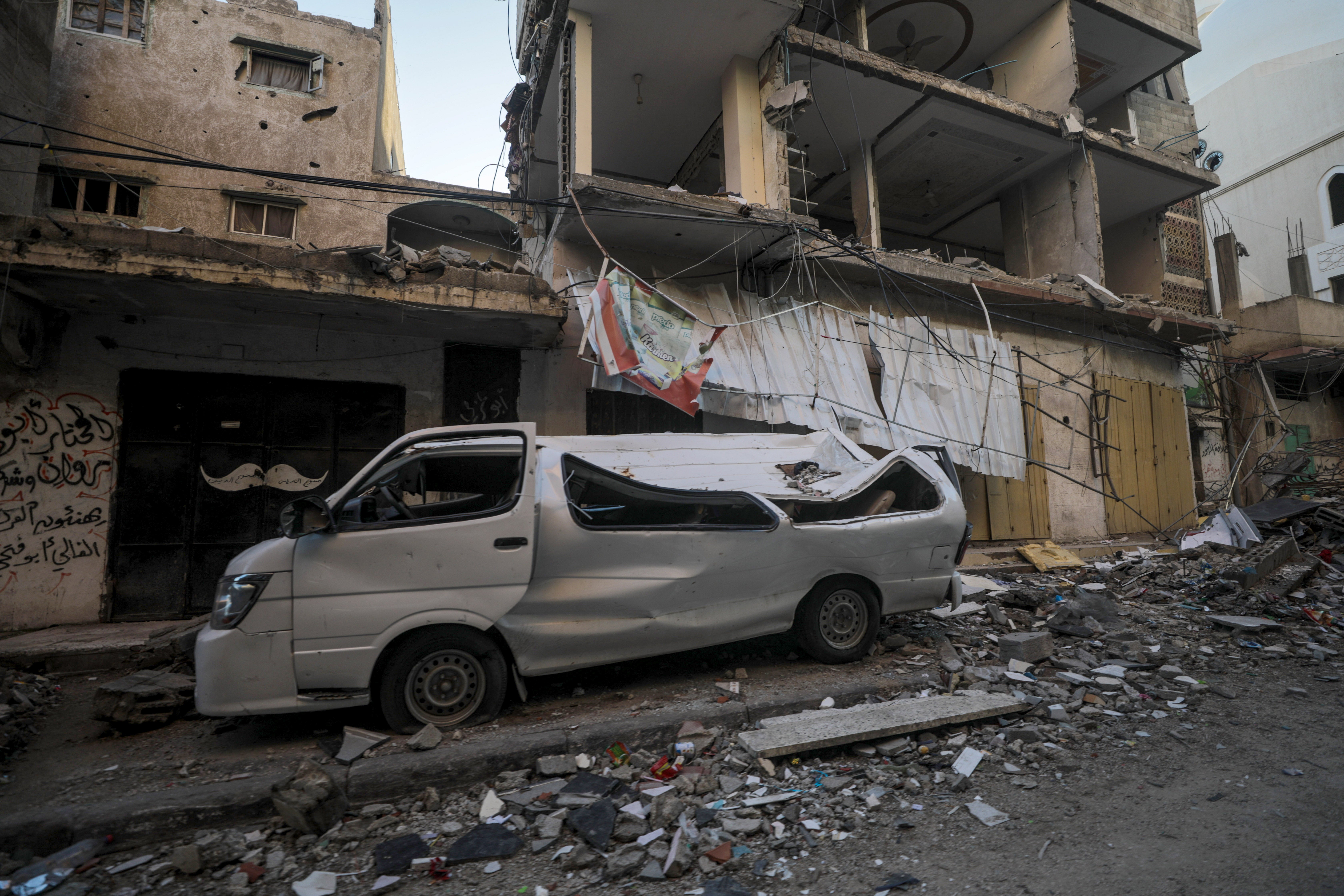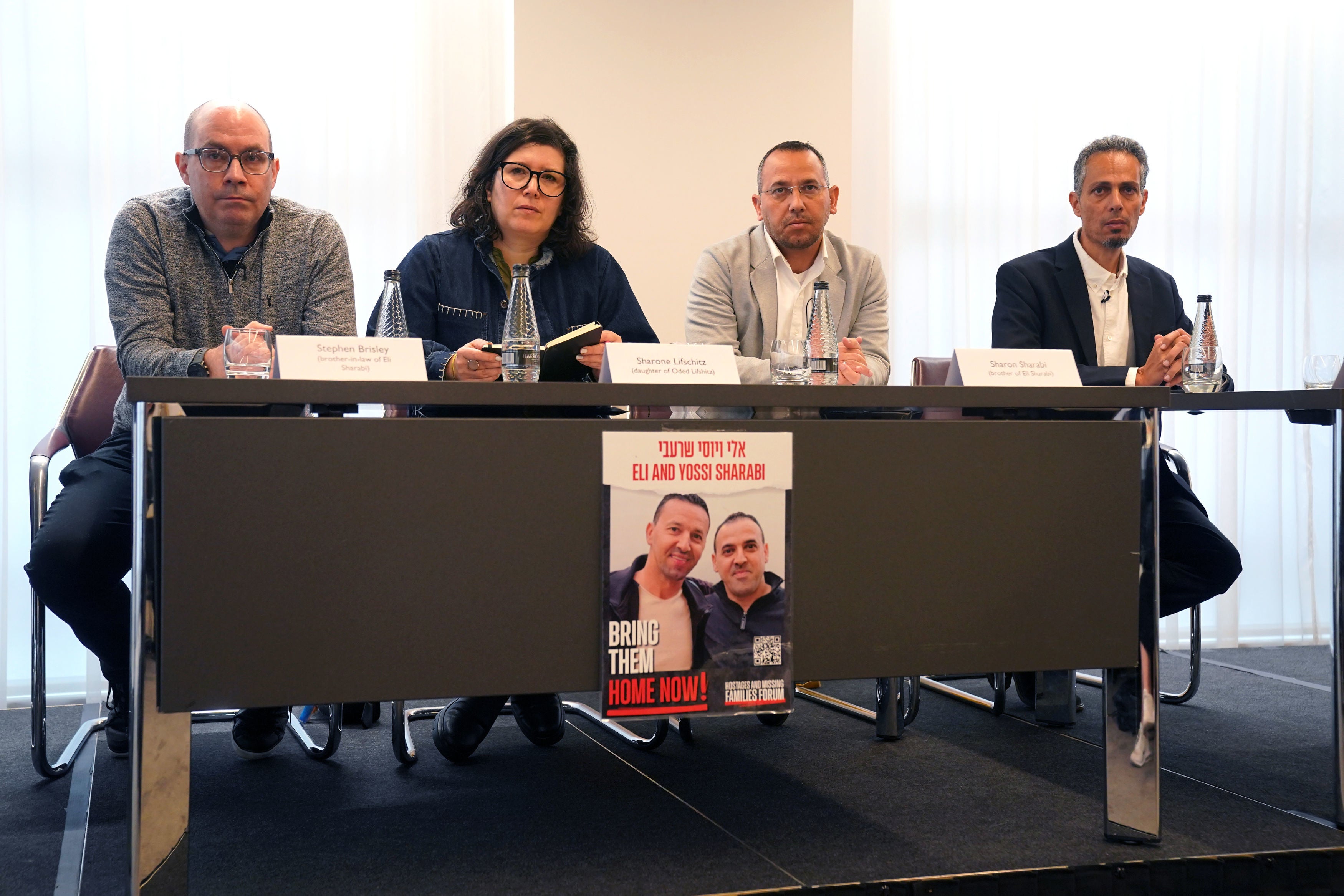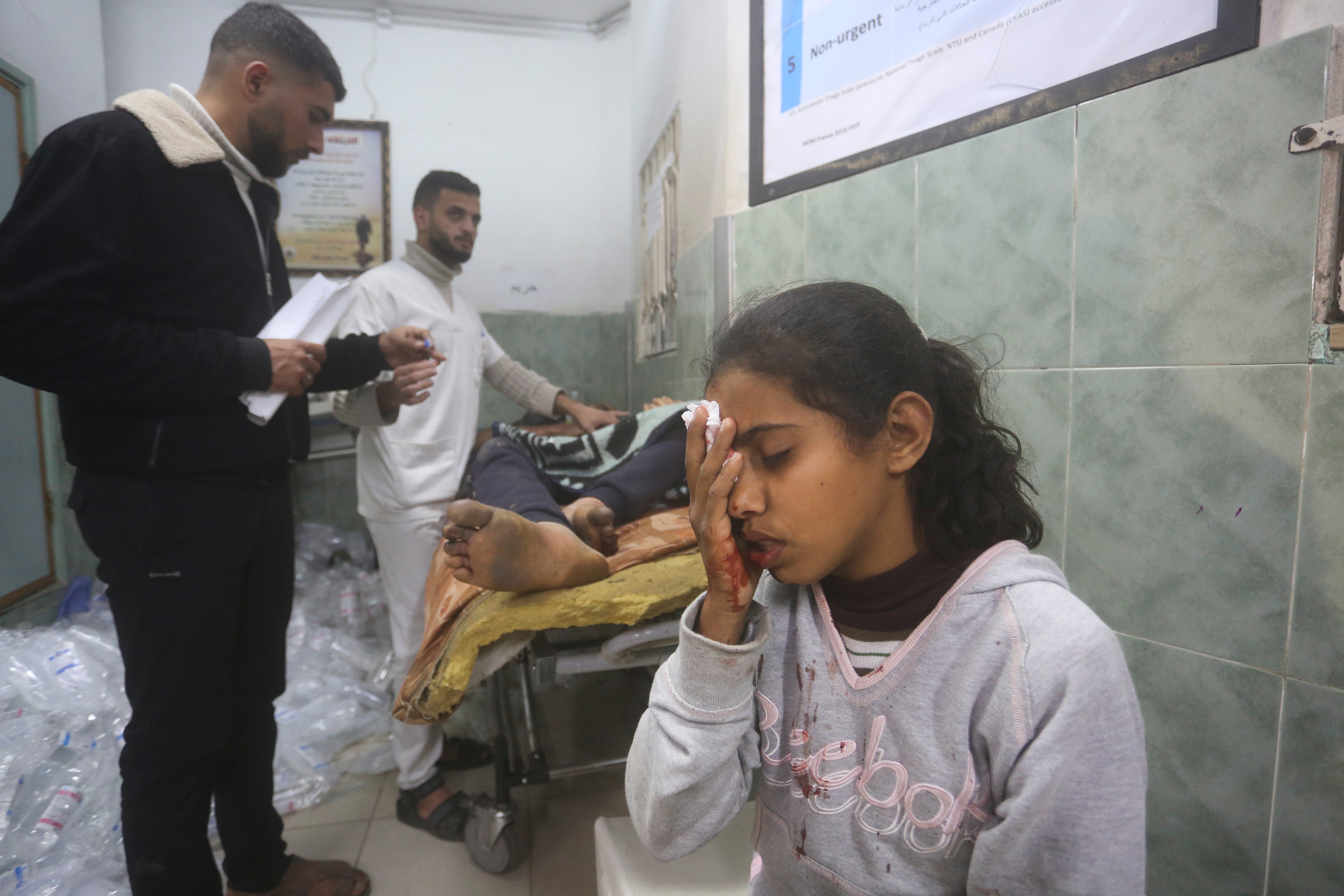Netanyahu rejects Hamas ceasefire proposal – as Gaza hostage families say time running out to save loved ones
Israeli prime minister says no peace deal without ‘total victory’ after militants propose new 135-day ceasefire
Your support helps us to tell the story
This election is still a dead heat, according to most polls. In a fight with such wafer-thin margins, we need reporters on the ground talking to the people Trump and Harris are courting. Your support allows us to keep sending journalists to the story.
The Independent is trusted by 27 million Americans from across the entire political spectrum every month. Unlike many other quality news outlets, we choose not to lock you out of our reporting and analysis with paywalls. But quality journalism must still be paid for.
Help us keep bring these critical stories to light. Your support makes all the difference.
Benjamin Netanyahu has rejected a proposal from Hamas for a 135-day ceasefire in Gaza as part of a deal that would also see the release of the hostages being held in Gaza. His rejection came as the families of those being held captive say time is running out to save their loved ones.
The Israeli prime minister said that only a “total victory” over Hamas will keep Israel safe following the attack by the militants on 7 October and claimed that military pressure is required to make sure the hostages are set free. “The day after is the day after Hamas. All of Hamas,” he said.
On Wednesday, Hamas proposed a four-and-half-month ceasefire deal, during which all hostages would be released in multiple stages. The agreement would also include the withdrawal of Israeli troops from Gaza, a point Israeli officials have said previously they would not agree to.

Mr Netanyahu claimed negotiations with Hamas, which are being mediated by Qatar and Egypt, were “not going anywhere” and described their demands as “bizarre”. Qatari officials have spoken of their optimism about getting a deal done. The Israeli leader said “there is no other solution” to the war in Gaza “but a complete and final victory”.
“Surrendering to Hamas’ delusional demands that we heard now not only won’t lead to freeing the captives, it will just invite another massacre,” Mr Netanyahu added.
A senior Hamas official was quoted by Reuters as saying Mr Netanyahu’s remarks were a “form of political bravado” and show he intends to pursue the conflict in the region.


Pressure has been growing for weeks on Mr Netanyahu, both internationally and domestically, over Israel’s war in Gaza.
Over the last 24-hours families of those captured by Hamas have met world leaders including UK prime minister Rishi Sunak and Qatari diplomats in London, as well as French president Emmanuel Macron, King Felipe VI of Spain and Portuguese president Marcelo Rebelo de Sousa.
In all the meetings, they begged the leaders to support their cause and help bring about the immediate return of the more than 100 remaining captives still in Gaza.
The flurry of activity comes as Israeli intelligence reports have revealed that as many as 51 of the remaining hostages have been killed since they were taken captive during Hamas’s 7 October attack on southern Israel that killed around 1,100 people. There are concerns many more will die as Israel vows to ramp up its ferocious bombardment of the Hamas-controlled strip, which Gaza’s health officials say has killed more than 27,500 Palestinians, mostly women and children.
Antony Blinken, the US secretary of state, who visited Tel Aviv on Wednesday, discussed the ceasefire offer with Mr Netanyahu following talks with the leaders of Qatar and Egypt, the countries that have acted as mediators in the conflict. Mr Blinken later met Palestinian president Mahmoud Abbas in Ramallah. The US’s top diplomat said “there’s a lot of work to be done” to reach a hostage release deal.

But the families of hostages warned time is running out and said that action had to be taken. "Now is the time to secure the deal," said Steve Brisley, from South Wales, who is campaigning to free his brother-in-law, Eli Sharabi.
After meeting Mr Sunak at Downing Street, relatives of the captives in London said that there had been a "failure of international diplomacy" and urged the Israeli government to agree to any deals currently on the table.
Sharone Lifschitz, whose father Oded is still held by Hamas, said Israel has to accept the current deal proposed by Hamas to save lives. “I don't think Israel has another option. I think that the contract between the government and its people is based on their safety," she said.
Gill Dickmann, whose cousin Carmel, 39, is also a captive, said that the families “still know nothing” about the details of the new deal and are very worried that progress is too slow.
“From the statements of the Qatari prime minister we expected to get much better news much sooner,” he told The Independent.
“We have no choice but to hurry things up because we’re losing Hostages. [On average] one hostage dies every 2.5 days.”But the families of hostages warned time is running out and said that action had to be taken. “Now is the time to secure the deal,” said Steve Brisley, from South Wales, who is campaigning to free his brother-in-law, Eli Sharabi.
After meeting Mr Sunak at Downing Street, relatives of the captives in London said that there had been a “failure of international diplomacy” and urged the Israeli government to agree to any deals currently on the table.
Sharone Lifschitz, whose father Oded is still held by Hamas, said Israel has to accept the current deal proposed by Hamas to save lives. “I don’t think Israel has another option. I think that the contract between the government and its people is based on their safety,” she said.
Gill Dickmann, whose cousin Carmel, 39, is also a captive, said that the families “still know nothing” about the details of the new deal and are very worried that progress is too slow.
“From the statements of the Qatari prime minister we expected to get much better news much sooner,” he told The Independent.
“We have no choice but to hurry things up because we’re losing Hostages. [On average] one hostage dies every 2.5 days.”

President Macron held a tribute to the hostages on Wednesday in Paris to mark the fourth month since their capture. There, families of French hostages said that they needed “help not hope”.
“We don’t need people to hope for us. I have hope. We need help,” said Ayla Yahalomi Luzon, sister of French-Israeli hostage Ohad Yahalomi. “Ohad is a French citizen and I ask France to make all efforts to release him and everyone.”
Israel remains deeply shaken by the 7 October Hamas attack, during which militants burst through the country’s fences and rampaged across southern Israel.
More than 100 hostages were released in a weeklong ceasefire deal in November, but Israel believes a similar number remain inside the besieged territory. Their families fear they are at risk of death every day as Israel continues its heaviest bombardment of the area during a ferocious ground invasion.
Hamas presented the new ceasefire offer in response to an earlier proposal drawn up by US and Israeli spy chiefs and delivered to Hamas last week by Qatari and Egyptian mediators.
According to the document seen by Reuters, the first 45-day phase would see the release of all Israeli women hostage, men under 19 as well as the elderly and sick in exchange for Palestinian women and children held in Israeli jails. This period would also include a withdrawal of Israeli troops from Gaza’s most populated areas.

The second phase would focus on the release of the remaining male hostages in tandem with a full Israeli military withdrawal from Gaza, alongside indirect talks for a permanent truce.
The third phase would see the exchange of the remains of the dead.
A source close to the negotiations told Reuters that the Hamas counter proposal did not require a guarantee of a permanent ceasefire at the outset, but that an end to the war would have to be agreed before final hostages were freed.
Hamas also wants guarantees that the ceasefire would be upheld and not collapse as soon as hostages go free.
But there are still yawning gaps between both sides in this new version of the deal. Israel has previously said that it would refuse to pull out troops from Gaza or to end the war until Hamas is annihilated.
Israel’s defence minister Yoav Gallant has, meanwhile, vowed to press ahead with their ground assault, advancing into the southern town of Rafah, which lies on the border with Egypt and is the last refuge for civilians in Gaza.
The storming of Rafah – where an estimated 1 million Palestinians are sheltering – has raised alarm among international rights groups and agencies. Cairo has warned that the deployment of Israeli forces along its border, could violate a decades-old peace treaty between the two countries.
In Rafah, Palestinian civilians who have been displaced multiple times said they have “nowhere left to go”. Nizam, 35, who is living in a tent with his family, told The Independent: “All we can do is pray for a truce.”
Subscribe to Independent Premium to bookmark this article
Want to bookmark your favourite articles and stories to read or reference later? Start your Independent Premium subscription today.

Join our commenting forum
Join thought-provoking conversations, follow other Independent readers and see their replies
Comments